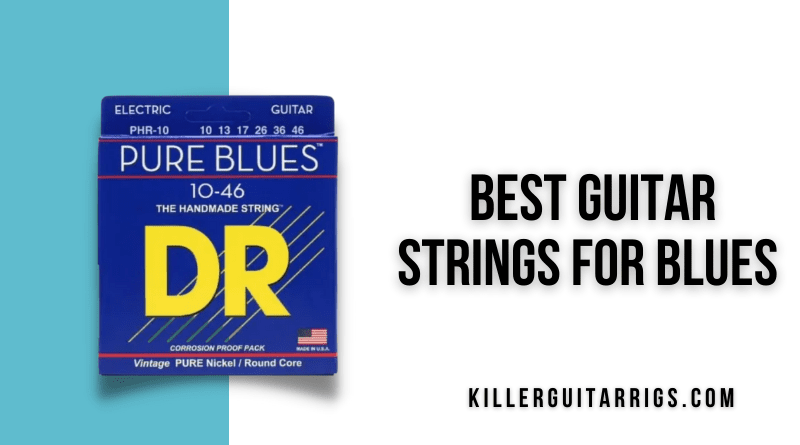If you’re just starting to take the blues seriously, you’re almost certainly going to want to look beyond your guitar, amp, and speakers and begin exploring other modifiable components in order to fine-tune your sound. Blues is all about feel, the way in which the guitarist connects with their instrument. Seeing as how the strings are the first point of contact, this is a great place to start.
In this KillerGuitarRigs Guide, we reviewed the very best guitar strings for blues available today. To make sure each set of strings was reviewed fairly, all were tested while installed on a 2020 Epiphone SG Standard and played through a Bugera V22 Infinium with a MXR Sugar Drive Mini overdrive pedal and a Way Huge Smalls Aqua Puss delay pedal.
During the test we looked for:
- Tuning stability – did the strings hold their tune?
- Playability – were the strings able to play expressive bends and vibrato?
- Overall tone – did the strings sound bluesy enough?
Read more about our review process.
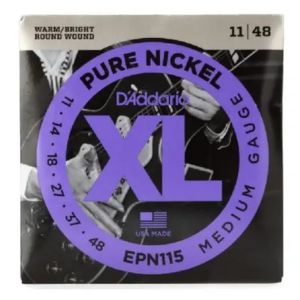
D'Addario EPN115 Pure Nickel
Features: Pure nickel wrap, Precision hex core, High carbon steel core
Benefits: Exceptional warmth, Great feel, Consistent from pack to pack
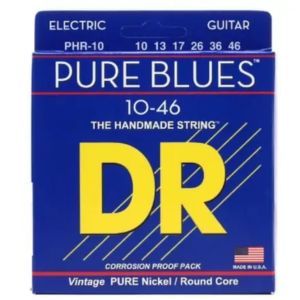
DR Strings PHR-10 Pure Blues
Features: Roundwound, Pure nickel wrap, Corrosion proof packaging
Benefits: Survives well in storage, Rich tones, Excellent sustain
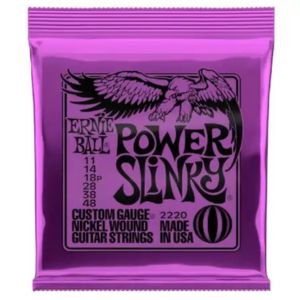
Ernie Ball 2220 Power Slinky
Features: Nickel plated steel wrap, Tin-plated hex steel core, Custom gauge
Benefits: Great price point, Widely available, Excellent tonal balance
Contents
Our Top 3
In this test, the DR Strings PHR-10 Pure Blues were our Top Pick. These are handmade and simply bursting with character. Tested in medium gauge, they were very impressive, with excellent clarity, and a beautiful midrange punch.
Our Best Budget option was the Ernie Ball Power Slinkies. Ernie Ball’s Slinky strings have been favorites of pros across the globe for decades and it’s easy to see why. They offer superb value for money, and offer fantastic blues tones.
If you’re looking for the very best blues strings money can buy, check out our Editor’s Choice, the D’Addario EPN115 Pure Nickel in medium gauge. They’re made in the USA from the finest materials, including a pure nickel wrap that really helps these strings come alive.
DR Strings PHR-10 Blues – Our Top Pick
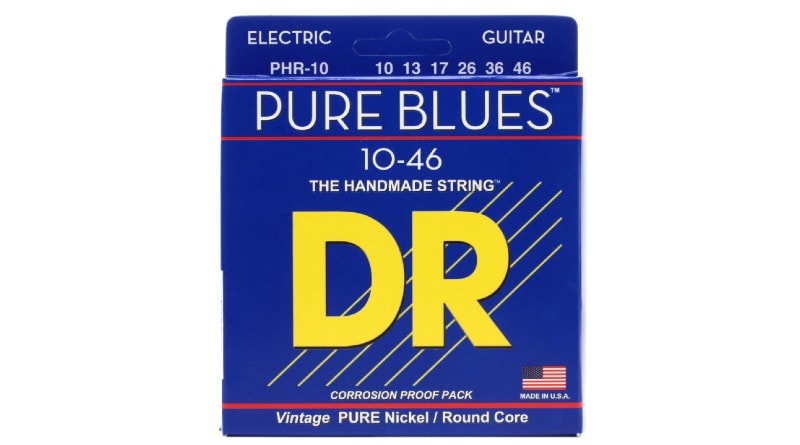
A quintessential blues sound and near perfect intonation right out of the packet.
DR Strings aren’t really a household name, but with strings like the PHR-10 Blues, they really should be. These strings are handmade, which can sometimes come with its own set of issues. But in this case, everything was just so. The construction technique uses traditional methods, which really helped the old-school vintage blues tones to shine through.
The sustain on offer was incredible. Single notes in solos lasted for what felt like an eternity, which made the expressive playing you want in the blues style an absolute breeze. These strings also handled vibrato beautifully.
Comfort-wise, this set was a pleasure to play. They offered just the right amount of resistance to prevent overshooting the target fret while still making it easy to get up and down the neck. There was very little effort required in fretting notes and bends came easy. For reference, these strings were reviewed in a light-medium gauge of .010”.
Tuning stability was superb. They needed no time at all to settle on the guitar and held up extremely well to some fairly heavy-handed string bends.
The tones from these strings were beautiful, too. They are round-wound and feature a pure nickel wrap wire, which resulted in bell-like clarity at all positions on the fretboard. Despite the bright, clean nature, they had an undeniable warmth with the tone rolled down on the guitar and responded really well to just a touch of overdrive and delay.
Verdict: Blues players should absolutely consider keeping a set of DHS Strings PHR-10 Blues Strings on their guitar full-time. Tonally, they were everything you could want in a set of blues strings, they’re well made, and are surprisingly inexpensive considering they’re handmade in the USA.
Ernie Ball Power Slinky – Best Budget Option
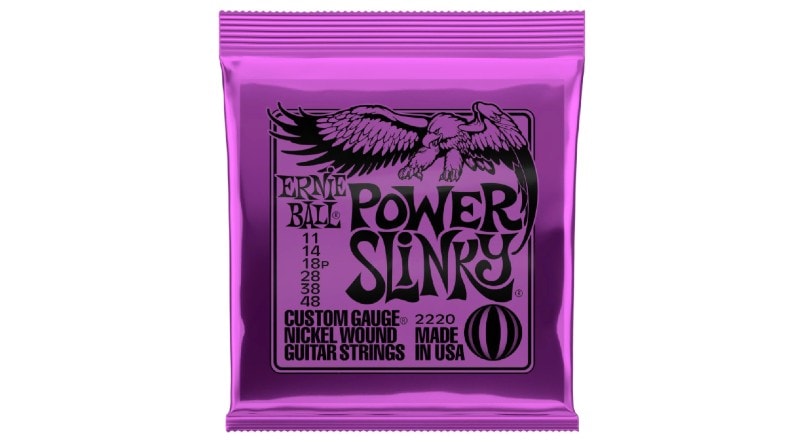
Custom-gauge strings that can handle the entire electric blues spectrum.
Ernie Ball’s Power Slinky strings are the go-to for some of today’s biggest blues artists, including the already legendary Christone “Kingfish” Ingram. These are a medium gauge at .011, but they played more like a light.
Despite the fact that they play similarly to a light-gauge string, the heavy bottom end really allows you to dig in during solos, resulting in astronomical tones. The sounds that were extracted were incredible, bottom-heavy and fat, with a great midrange punch.
As you’d expect from a set of Ernie Ball strings, tuning stability was good. After the initial tune and stretch, they were good to go and required very little adjustment for the rest of the test.
In typical Ernie Ball fashion, they were very comfortable to play. Despite being a medium gauge, they were easy to depress and bend and gave great feedback, too. This made it easy to bring bends up to the right pitch every time.
These strings are nickel-plated steel, which when played with light FX aren’t vastly different from pure nickel. But as soon as you switch to a clean channel, the difference is more apparent.
Verdict: If you’re looking for strings that have full, rich tones, but are also brilliantly playable, and you’re looking to save money at the same time, look no further. The Ernie Ball Power Slinkies are truly great strings for blues.
D’Addario EPN115 Pure Nickel – KGR Editor’s Choice
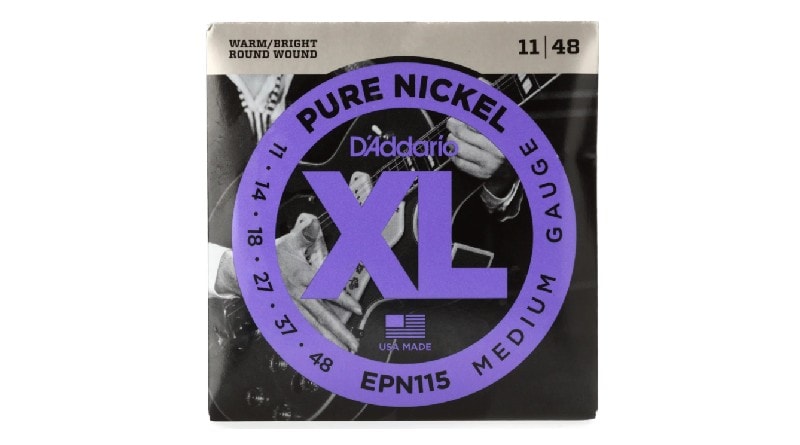
Pure nickel-wrapped strings with big, bold tone.
The most striking initial observation about the D’Addario Pure Nickel XLs was just how soft and mellow they were, yet how nicely the shimmering overtones from the pure nickel wrap shone through. We tried these strings out in an 11 gauge and they were absolutely fantastic.
Tuning stability was great overall. The strings settled quickly and once they’d had a few hours of play on them, they became rock-solid, holding pitch very well for extended use with lots of bends.
Tonally, these strings were right where you want strings for blues to be. The sustain was just right for high-end BB Box noodling and the vibrato response was perfect.
As far as playability went, these strings do play very much like a medium gauge. They aren’t as supple as lighter strings, but you’re ultimately rewarded with huge tone and sustain that hangs on for days.
Externally, the feel of the strings was good. If you know anything about D’Addario, it’s probably that they use high-end materials and advanced manufacturing techniques. This results in a great finish and excellent consistency between packs, and this was absolutely apparent.
Verdict: If you’re happy to spend a little extra, there are no finer strings for blues than the D’Addario Pure Nickel XLs. D’Addario has been in the business for such a long time, and they truly do make a great product. They offer wonderful tones and great sustain, and the pure nickel finish really helps with longevity.
Dean Markley Blue Steel
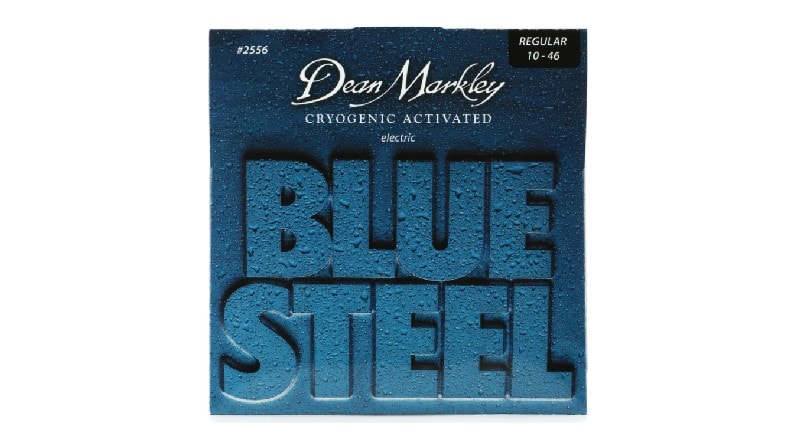
Handmade strings engineered for a longer life span.
Dean Markley’s Blue Steel strings are noted for their extended lifespan and were one of the standouts in our recent roundup of the best acoustic guitar strings. Their electric strings are no less impressive. While they’re something of a boutique brand compared to giants such as Ernie Ball and D’Addario, their Blue Steel strings definitely stand out from the crowd.
In testing, the regular gauge strings (10s) were found to have excellent playability. They were comfortable, fast, and really easy to play. While you might expect strings from a smaller company to be riddled with inconsistencies, this wasn’t the case with the Blue Steels. They were a pleasure to bend, allowing us to get up and down the fretboard without issue.
These strings are rapidly cooled during manufacturing in a liquid nitrogen cryogenic bath. Dean Markley claims that it realigns the molecular structure to create a “brighter, longer-lasting string”. Possibly as a result of this, the strings are on the brighter side for a blues string, though this could also be due to the steel core and solid stainless steel wrap.
That being said, the big benefit of having a stainless steel wrap is the longevity. Throughout our testing, the Blue Steels lost none of their tone. While they are a more expensive string, they offer excellent value for money, and are perfect for the player who likes their guitar to spend more time on the stage and less on the bench.
Verdict: If you’re looking for long-lasting strings, the Dean Markley Blue Steels are a great choice. While they are a little bright for traditional blues, if you enjoy a highs biased sound, you may just like these strings, especially considering how playable they are. Tuning stability was excellent and because of the steel construction, they didn’t need much, if any, stretching.
GHS Guitar Boomers
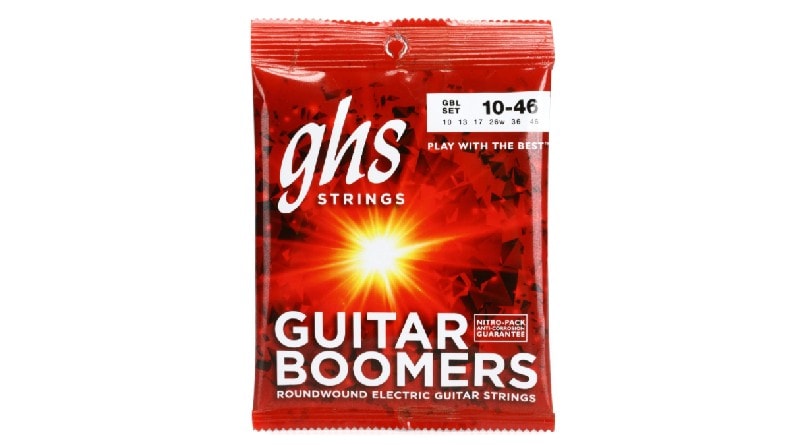
Extreme reliability and genuine bluesy warmth.
GHS strings are one of the few “secrets of the pros” type brands left in the business. They aren’t a small operation by any stretch, but because their budget goes to R&D rather than mass marketing, their products do the talking.
From a quality standpoint, the GHS Guitar Boomers are fantastic. They arrive nitrogen sealed in individual packages, which ensures they remain as fresh as the day they were made, right up until you install them. This is a claim we’re happy to report is absolutely true. They were some of the clearest strings we’ve ever had on the test bench.
These strings were tonally balanced, but perhaps too balanced. There wasn’t much in the way of under or overtones, which resulted in a pretty bland sound. Not offensive by any means, but a little too sterile for blues. They responded well to FX, but if you’re playing clean, this could be an issue.
Their playability was overall good. String feel was nice, and vibratos and bends came easily. GHS are the same brand who brought you “fast fret” string lubricant, so ease of movement around the fretboard is definitely in their DNA, and it shows here.
Tuning stability was a strong point for the Guitar Boomers. They settled in quickly, and rarely needed adjusting even after extended play.
Verdict: The GHS Guitar Boomers are high-quality strings that offer excellent comfort, tuning stability and longevity. Because great blues music relies so heavily on feel and emotion, the almost direct split balance between lows, mids, and highs does leave them sounding a little boring, but this might well be something you’re looking for if you plan to record and want an easy editing process.
How To Choose The Right Strings For You
It’s worth repeating that a great bluesman makes their guitar sing – literally. It’s this feel that shines through and makes people want to listen. To achieve this, you’ll need to know a little more about the properties of guitar strings that help guitarists play with the expressiveness the genre calls for.
Gauge
The best gauge, or thickness, of a good guitar string for blues is really dependent on the style of blues you play. Stevie Ray Vaughn was known to play extremely heavy strings – 0.013s to be exact. He did this to get the fattest possible tone he could muster, so if you’re looking to play like SRV, go heavy.
Do bear in mind that the heavier the strings, the more difficult they are to play. If you’re a beginner, you’re definitely going to want to work your way up to this type of string weight progressively. You should also remember that extremely heavy strings may require modifications to your guitar. At the very least, they’ll require a fresh setup if you’re changing from a lighter gauge.
Many traditional blues players like Eric Clapton, BB King, and even more modern artists like John Mayer, opt to use light- to medium-weight strings, typically around 0.010 to .011. This provides a lot of warmth and sustain on those neverending vibratos, while still allowing them to play expressively, bending up over a step on pretty much all the strings.
Materials
Blues has never been about high-tech equipment and the latest technology. Some of the greatest musicians ever to play the blues have used $5 pawnshop guitars with missing strings! So it’s safe to say you don’t need to think outside the box when it comes to selecting great strings for blues.
Strings with steel cores and pure nickel or nickel-plated wrap are going to yield the best possible results for blues. They offer the right amount of brightness, while still allowing for smooth, mellow mids and lows.
I purposefully excluded coated strings from this top 5 list. In other applications, coated strings are incredible. They offer smooth feel and great longevity, but they lack the soul that is needed in a great blues sound.
Acoustic or Electric
Perhaps the biggest consideration is whether you plan to play blues on the acoustic or electric guitar. While there’s nothing stopping you from installing acoustic strings on an electric and vice versa, you won’t get the best blues tone this way. Try and stick to strings designed for instrument you’re playing.
Final Thoughts
All of the strings in this guide have earned their spot on this list for one reason or another. Of course, the DR Strings Pure Blues were the worthy winners of our Top Pick designation. While blues is mostly about the heart that goes into playing, these strings provided the extra something that pushed the sound to “perfect” status. Ernie Ball’s Power Slinky strings are a great choice for those looking for an honest to goodness blues sound without breaking the bank. Players looking for a premium string will definitely enjoy the D’Addario Pure Nickels. They were warm and mellow, offering the rich, bluesy sound that many crave but don’t know how to find.
Check out our full rundown for best electric guitar strings.

